
Revolutionary Brain Surgery Technique Allows Patient to Leave Hospital in Just 48 Hours!
2024-10-26
Author: Rajesh
Groundbreaking Medical Achievement
In a groundbreaking medical achievement, a 75-year-old woman has become the first person globally to have a brain tumor successfully removed through an eyebrow incision, as reported by the UK's National Health Service (NHS). This innovative surgical technique signifies a remarkable advance in neurosurgery, dramatically reducing both the operating time and recovery period for patients.
Doreen Adams' Experience
Doreen Adams, who underwent this pioneering procedure at a hospital in Grampian, Scotland, previously faced an unsuccessful traditional craniotomy to address her brain tumor. Reflecting on the stark contrast between the two surgical experiences, Adams described the new operation as "night and day."
The Modified Eyebrow Keyhole SupraOrbital Approach
The surgery was performed by Dr. Anastasios Giamouriadis, a forward-thinking NHS surgeon who adapted an already existing method to enhance its efficacy. The new technique—dubbed the Modified Eyebrow Keyhole SupraOrbital Approach—only requires about three hours of operating time, compared to the 8-10 hours typically needed for a craniotomy, which involves removing part of the skull to access the brain.
A Game-Changer in Neurosurgery
“It’s a game-changer and much less invasive,” Dr. Giamouriadis stated. He revealed that this operation allows for the removal of larger brain tumors with minimal scarring, leaving patients with just a small mark and a temporary black eye. "Before, we had to do a craniotomy for complete access, which was time-consuming," he explained. This technique not only improves patient outcomes but also alleviates the exhaustion that accompanies lengthy surgeries.
Swift Recovery and Positive Feedback
Adams was able to walk out of the hospital just two days after her operation, a feat that would have been unimaginable with traditional methods. Her swift recovery has been echoed by other patients who have benefited from this innovative treatment—a majority report returning to their daily lives within days post-surgery.
Benefits for Patients and Healthcare System
Dr. Giamouriadis emphasized the procedure's dual benefits: both for the patient and the healthcare system. "Patients wake up immediately after surgery and often go home the next day, which maximizes hospital capacity," he noted. Furthermore, the procedure has been recognized by notable organizations, such as the British Neurological Society and the European Association of Neurosurgical Societies, endorsing its efficacy and safety.
The Future of Neurosurgery
The success of this surgery opens the door for future developments in neurosurgical techniques, potentially making procedures less daunting for patients worldwide. "The ability to have brain surgery and be back to normal within a few days is quite incredible," Adams concluded, reflecting the optimism that this advance brings not only to patients facing similar medical challenges but to the field of neurosurgery as a whole.
Looking Ahead
As we look forward, could this be the dawn of new, less invasive surgical alternatives for other complex medical procedures? Only time will tell, but the strides made in neurosurgery certainly give us hope for a future where medical interventions are both safer and more patient-friendly.




 Brasil (PT)
Brasil (PT)
 Canada (EN)
Canada (EN)
 Chile (ES)
Chile (ES)
 España (ES)
España (ES)
 France (FR)
France (FR)
 Hong Kong (EN)
Hong Kong (EN)
 Italia (IT)
Italia (IT)
 日本 (JA)
日本 (JA)
 Magyarország (HU)
Magyarország (HU)
 Norge (NO)
Norge (NO)
 Polska (PL)
Polska (PL)
 Schweiz (DE)
Schweiz (DE)
 Singapore (EN)
Singapore (EN)
 Sverige (SV)
Sverige (SV)
 Suomi (FI)
Suomi (FI)
 Türkiye (TR)
Türkiye (TR)